As Earth Day approaches, it’s the perfect opportunity for marketers to explore innovative ways to engage with eco-conscious customers. With a strong and growing interest in sustainable business practices worldwide, green audiences are becoming increasingly influential. In addition to being good for the planet, engaging these customers is great for any brand or organization striving to become more eco-friendly and socially responsible. By taking advantage of this timely event and using appropriate tools, you can create personalized campaigns that will both promote your brand and increase customer loyalty.
Eco-conscious audiences
In this blog post, we’ll cover three eco-conscious audiences to target this Earth Day:
- Solar energy
- GreenAwareTM
- Electric vehicles
Solar energy
Our first eco-conscious audience is Solar energy. Consumers in this audience show an inclination toward harnessing the power of the sun as a clean, renewable energy source. Our audience data can provide valuable insights into the Solar energy consumer base, including their age, education level, occupation, household income, and communication preferences. Let’s explore these metrics to better understand how to reach this group effectively.
Age and living situation
Consumers in our Solar energy audience are more likely to live in a home with two or more adults and are between the ages of 45-74.
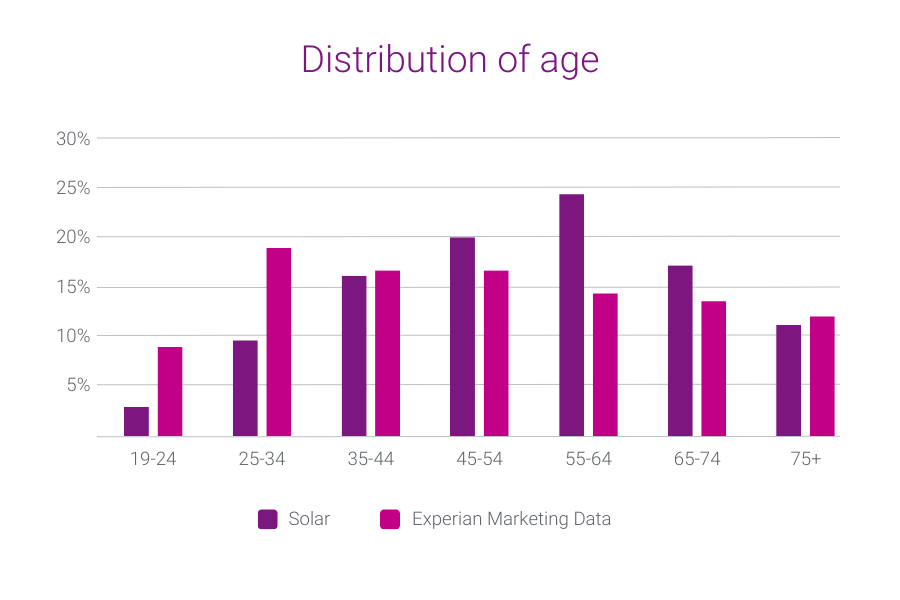
Education level and occupation
Consumers in our Solar energy audience are more likely to have graduated from college or graduate school and work in management-level occupations.
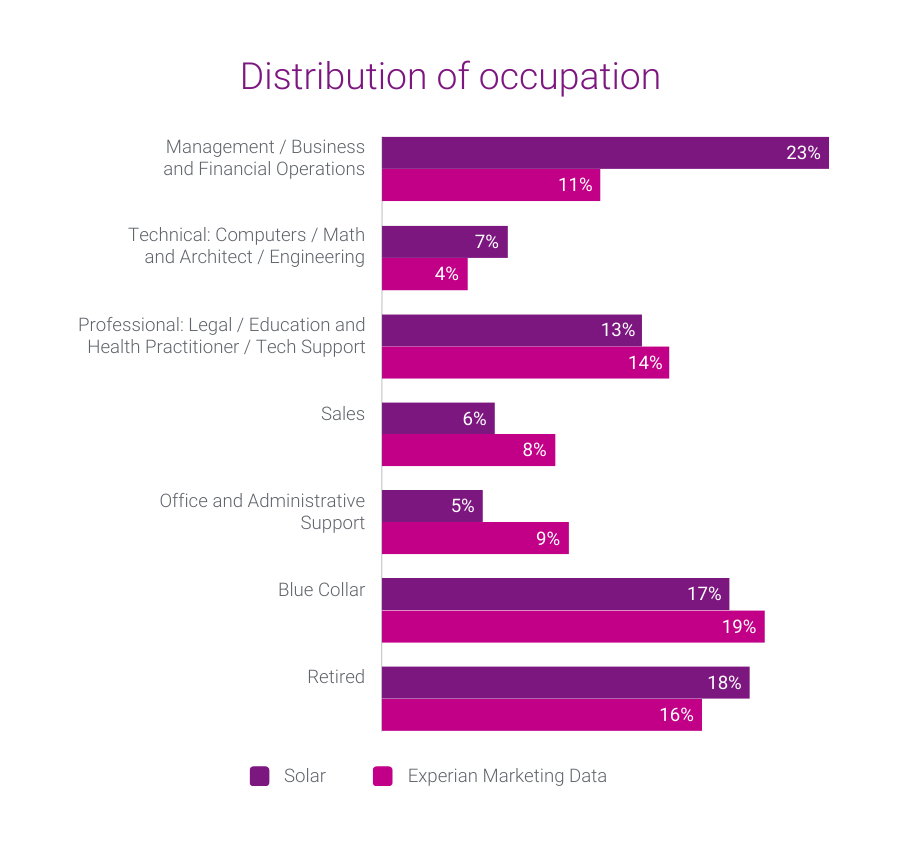
Household income
Consumers in our Solar energy audience have household incomes of more than $75,000 and their homes are valued at over $550,000.
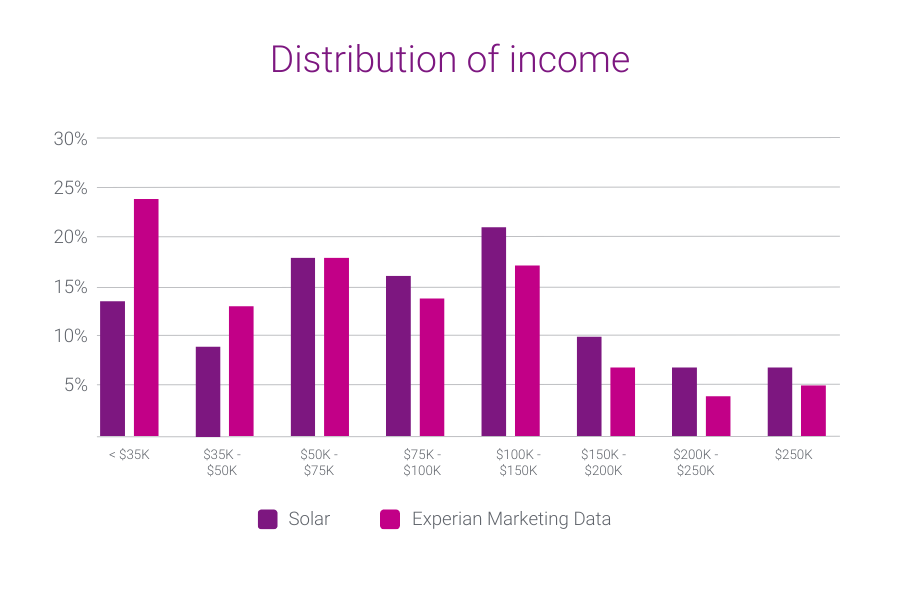
Preferred engagement channels
Consumers in our Solar energy audience are most receptive to ads served through digital channels like digital newspapers and email.
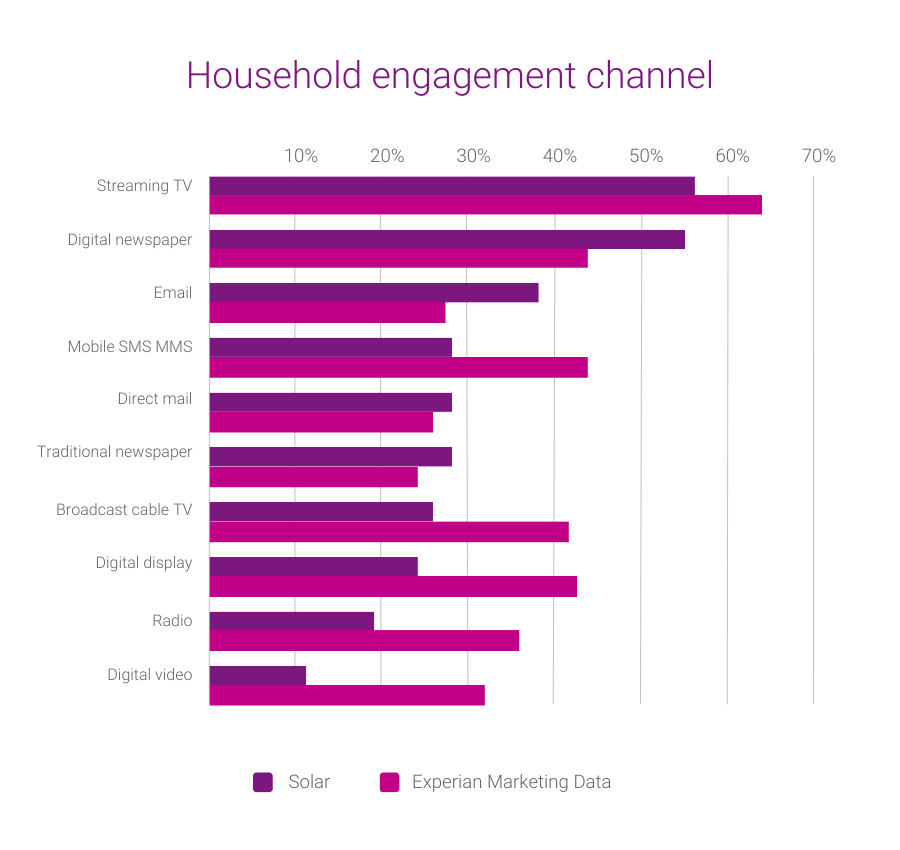
Solar energy audience pairings
Consumers in our Solar energy audience also belong to three of our Mosaic® USA groups:
- Power Elite
- Flourishing Families
- Booming with Confidence
Our consumer segmentation portal of 126 million households and 650 lifestyle and interest attributes empowers marketers like you to precisely target your ideal audience and communicate with them on a personal level. Mosaic’s data segments the U.S. into 19 overarching groups and 71 underlying types, giving you the insights needed to anticipate the behavior, attitudes, and preferences of your most profitable customers and communicate with them on their preferred channels, with messaging that resonates.
GreenAware
Our second eco-conscious audience is GreenAware.
GreenAware segments the 126 million U.S. households within Consumer View into four distinct groups. Each group differs in their attitudes and behaviors toward purchasing products that are environmentally safe and working with companies that are eco-conscious. We created these groups using an enhanced application of traditional statistical clustering techniques based on environmentally relevant measurements in Simmons’ National Consumer Study.
Based on the distinctive mindset of consumers toward the environment, you can learn how environmental concerns fit into their lives through four major consumer segments:
- Eco-Friendly Enthusiasts
- Sustainable Spectators
- Passive Greenies
- Eco Critics
Let’s dive deeper into each group to understand their unique perspective on the environment and how this impacts their attitudes and behaviors.
Eco-Friendly Enthusiasts
This eco-conscious segment prioritizes a green lifestyle and takes pride in avoiding products that harm the planet. With traditional and liberal values, they embrace optimism and prioritize family. With their children out of the house, they take the time for some well-deserved rejuvenation and are committed to a healthy lifestyle. Some members of this group are transitioning into retirement and welcoming a new chapter in their life.
- Mature adults and retirees
- College graduate or more
- Above average income
- May be married or single
- Typically own their homes
Sustainable Spectators
This segment aspires to be more sustainable, but they struggle with translating their green ideas into action. They have a soft spot for a cozy home. While their love for interior design and taking care of their own space is evident, they’re always looking for new experiences and opportunities to learn. Staying healthy and active is a top priority for this group, so it’s no surprise that they’re always looking for ways to stay fit and feel their best.
- Established and mid-life adults
- College graduate or more
- High income
- Typically married
- Likely to own their homes
Passive Greenies
This is the largest and one of the most youthful groups. Known for their love of exploration and self-discovery, they may not have fully embraced eco-conscious behaviors yet, but they are eager to stay current with the latest technology and trends. With their incredible ability to multitask, they’re always on-the-go, and constantly seek the next best thing.
- Mainly young adults and diverse
- Education ranges from high school through some college
- Below average income
- More likely to be single or divorced
- Typically rent
Eco Critics
This group is not likely to be eco-conscious and may have negative attitudes about the environment. They are confident, driven, and focused on their personal growth. They crave instant gratification, seeking out quick and easy solutions to their everyday decisions. They place a high value on entertainment, their social life, and carefully curate their image.
- Young and established adults
- Education ranges from high school through post-graduate studies
- High income
- Married or single
- Typically own their homes
Let’s take a look at how the GreenAware segments stack up against each other in terms of age, household income, education level, and media preference. How do they compare? Let’s find out.
Age
Consumers in the Eco-Friendly Enthusiasts segment are the oldest of the four GreenAware segments – about half of the consumers are 65 or older. Eco Critics are the youngest segment, with over half of consumers in this group between ages 25-44.
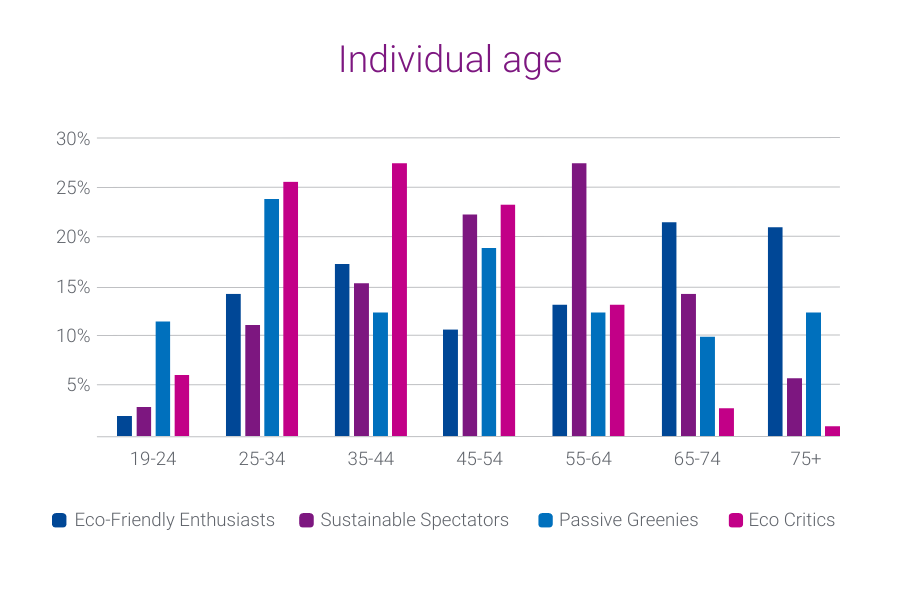
Household income
Sustainable Spectators and Eco Critics are the wealthiest GreenAware segments. The average household income of consumers in these segments is above $100,000. Passive Greenies have the lowest household income, with a majority below $50,000.
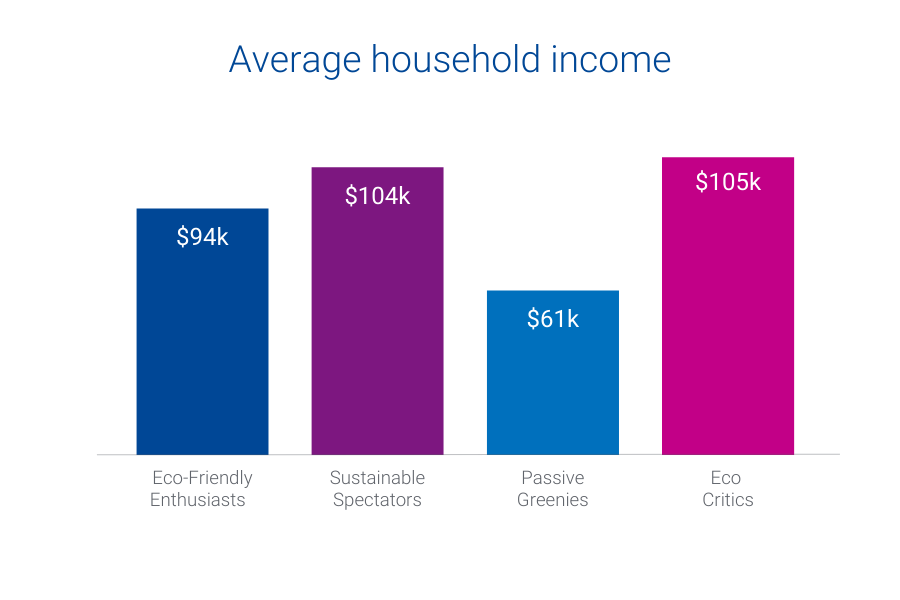
Education level and occupation
Passive Greenies are more likely to work Blue Collar jobs and have the lowest level of education. As the wealthiest segments, Sustainable Spectators and Eco Critics have the highest levels of college degrees and work in management, business, and financial operations. Eco-Friendly Enthusiasts are the most likely to be retired and out of the workforce.
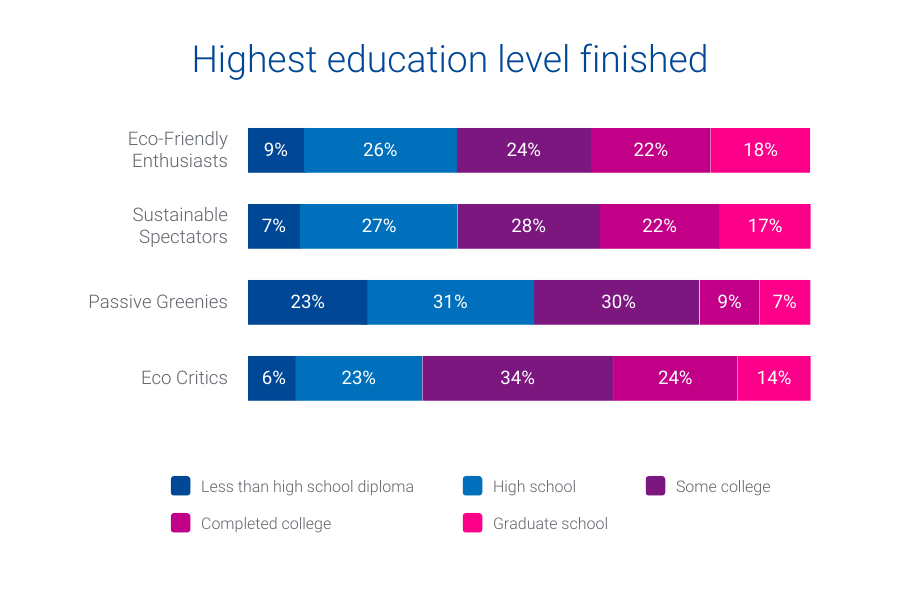
Preferred engagement channels
Streaming TV is the preferred engagement channel for all GreenAware segments.
Eco-Friendly Enthusiasts prefer digital channels like digital newspapers, mobile SMS, and email. They also engage with traditional channels like direct mail and newspaper.
Passive Greenies have a high preference for digital display, mobile SMS, digital video, broadcast cable TV, and radio.
Eco Critics have a high preference for digital channels like digital newspapers, mobile SMS, and digital display.
Sustainable Spectators strongly prefer digital newspapers. They don’t show as strong of a preference for mobile SMS and digital display as Eco Critics and Passive Greenies.
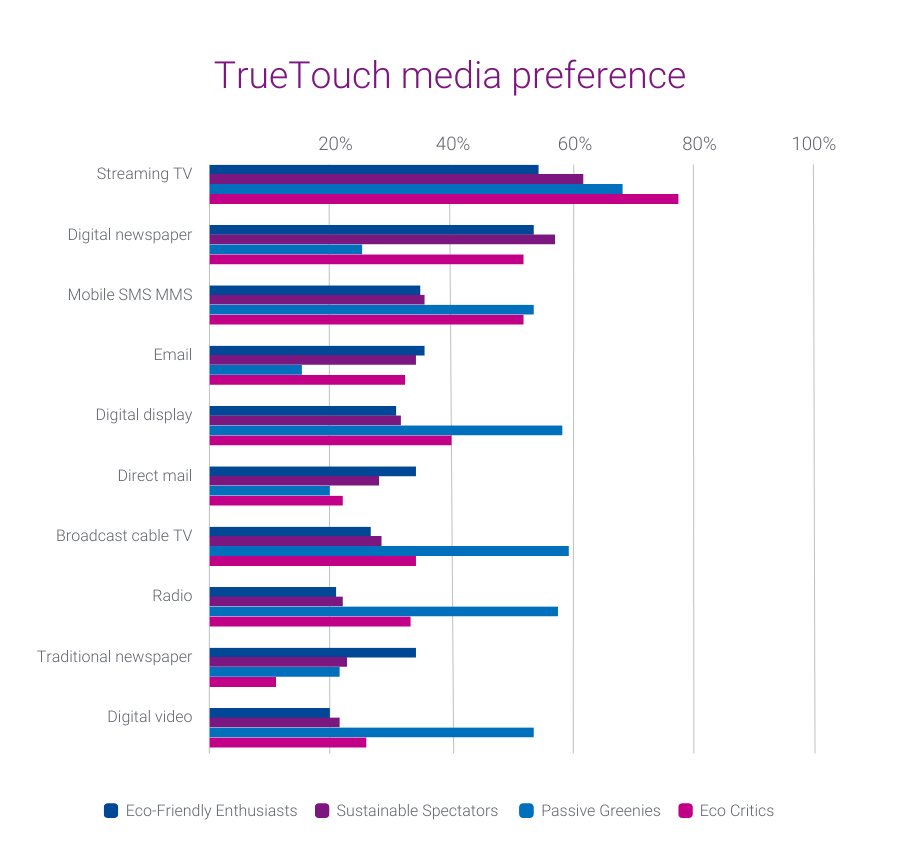
GreenAware audience pairings
Six of our Mosaic groups have at least one GreenAware segment with 10% or more of the population. For more precise targeting, below are suggested Mosaic audiences you can pair with each GreenAware segment:
| Eco-Friendly Enthusiasts | Sustainable Spectators | Passive Greenies | Eco Critics |
| Booming with Confidence | Power Elite | Singles and Starters | Power Elite |
| Autumn Years | Booming with Confidence | Golden Year Guardians | Suburban Style |
| Golden Year Guardians | Singles and Starters |
Electric vehicles
Our third eco-conscious audience is electric vehicles.
Electric vehicles (EVs) are having a major moment in the automotive industry. This is no surprise given that new EV models are being released and an increasing number of charging stations are popping up around the country. As EVs become more prominent, it’s essential to stay up to date on relevant trends to make informed decisions about what lies ahead.
The demand for electric vehicles (EVs) is on the rise
Consumers are embracing the EV revolution, showing their desire for a cleaner, greener future. Automotive marketers are increasingly looking to reach in-market EV shoppers and current alternative fuel vehicle owners due to the growing availability of electric vehicles, improved infrastructure, and rising popularity. In 2022, EVs charged up the market and accounted for a remarkable 6% of new retail registrations.
While Tesla continues to dominate the EV market, Ford, Chevrolet, and Hyundai are starting to compete, each holding more than 3% of the market share of new retail EV registrations.
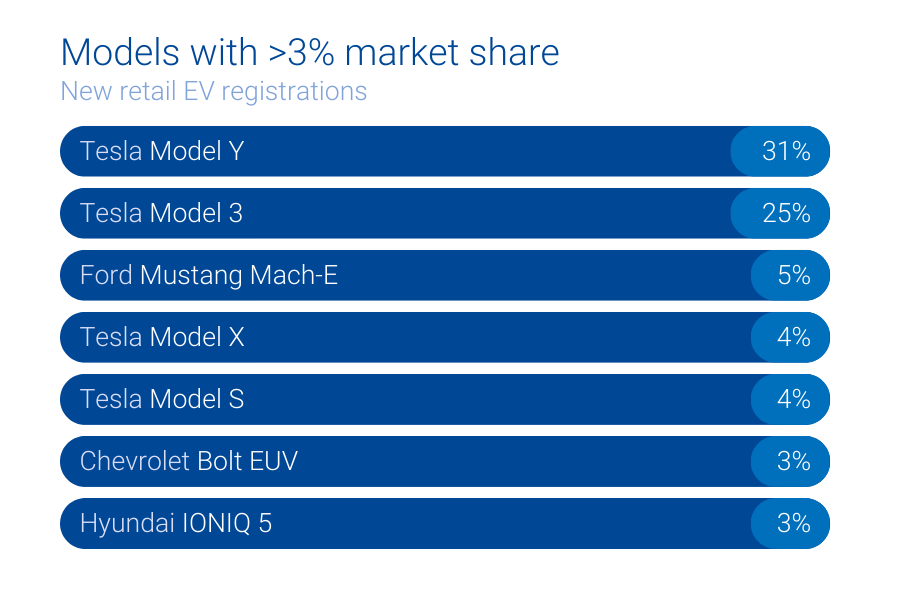
Geography
Where are we seeing the most new retail EV registrations? The top designated market areas (DMAs) for new retail EV registrations are mostly located in heavily populated, coastal cities like Los Angeles, CA and New York, NY.
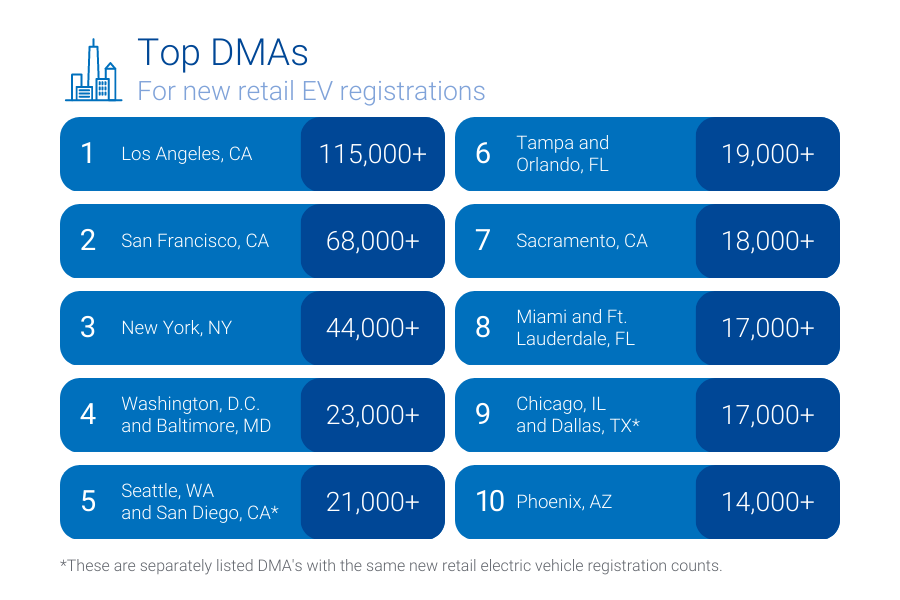
The fastest growing DMAs, however, are in smaller cities like Tucson, AZ and Oklahoma City, OK.
Generational demographics
Gen X and Millennials make up the largest percentage of new retail EV buyers at 37.5% and 34.4%. Gen Z and the Silent generation represent the smallest shares at 5% and 2.1%. Boomers hover between Gen X and Millennials’ share and account for 20.6% of new EV retail purchases.
EV audience pairings
Our top five Mosaic groups for new EV buyers include:
- American Royalty
- Cosmopolitan Achievers
- Philanthropic Sophisticates
- Couples with Clout
- Fast Track Couples
How to target consumers in-market for electric vehicles
We offer 70+ audiences that are focused on likely buyers and owners of EV and plug-in hybrid (PHEV) vehicles. We also offer a subset of 28 audiences focused on individual EV/PHEV vehicle models.
Below is how you can find a few of these audiences on-the-shelf of most trusted advertising platforms:
- Autos, Cars, and Trucks > In Market-Fuel Type > Electric
- Autos, Cars, and Trucks > In Market-Fuel Type > Used Electric
- Autos, Cars, and Trucks > In-Market Make and Models > Tesla
- Autos, Cars, and Trucks > In-Market Make and Models > Chevrolet Bolt EV
We can help you reach eco-conscious consumers
Earth Day is a great opportunity to get creative with your marketing efforts with our three eco-conscious audiences: Solar energy, GreenAware, and electric vehicles. To find out how you can add eco-conscious audiences to your marketing plan, contact us.
Latest posts

To set your brand apart from the competition (and thrive!), you need to get to know and communicate with your customers on a more personal level—this means knowing more than just their email or mailing address. It means building a relationship with them to turn them into loyal customers who keep coming back. To make this happen, retail marketers must engage with customers across all verticals and invest in true data-driven advertising. Consider the following: What do my customers do? If you know more about your customers’ lifestyles, interests and spending habits, you will have a better understanding of how they choose to spend their money and free time. Once you understand your core customer base, you can move on to how and when you should reach them. This starts with segmenting your customers and then reaching them across their preferred channels. You should then learn what motivates your customers in order to understand their buying behavior. Do they buy items spontaneously or do they spend a lot of time researching? Do they only buy things with a coupon or is free shipping more important? Lastly, determine what marketing is showing ROI so you can optimize your marketing campaign. To ensure your efforts are showing results and your marketing budget is getting the most bang for the buck, attribution is critical. Retailers should strive to get more value out of existing data, supplement it with third-party sources, and find better ways to manage it and extract valuable insights. Experian’s Customer Data Engine is the perfect solution to assist retailers with this challenge. This customer data platform helps provide you with a complete picture of online and offline customer engagement and delivers the data, tools, and insights needed to make decisions on reaching customers and lookalike prospects. Customer Data Engine is a centralized platform where first- and third-party data is managed and updated on an ongoing basis in a secure environment, providing retail marketers with analytical tools, lookalike prospects, campaign management, audience distribution and closed-loop measurement. Once retail marketers have a deeper understanding of what they need to know about their customers, they can create customized audiences using this data. Retailers value first-party data and often look at it first. Usually, this refers to online data about customer activity on a website or app, and can come from form and email submissions, views of merchandise or devices and things people searched for online. Although first-party data is gold, there is almost always additional information needed to fill in gaps. For instance, the need for recency, frequency and monetary (RFM) data is crucial. RFM data is a way for retailers to analyze their customers by using recency (how recent the customer made a purchase), frequency (how often a customer makes a purchase) and monetary data (how much money a customer spends on purchases). It gives the retailer the details of when the last time the customer made a purchase, how often does the customer make a purchase and how much did the customer spend. With this information, they will know who their most valuable customers are and be able to create customized audiences. To get a deeper understanding of your customers, solutions such as Experian’s ConsumerViewSM database can be leveraged to provide you with demographics, life event triggers, purchase data, lifestyle segmentation data and more. With thousands of data attributes available, it can take any business to the next level. According to global research firm, Coresight Research, retailers in the United States have announced 5,994 store closures in just the first 15 weeks of 2019. Changing consumer demands, and a volatile economy have made it difficult for retailers to keep pace. However, retail is not going to go away, and brands just need to be smarter about how they conduct business. Making sure you know and understand your customers is one of the ways to ensure repeat visits and set yourself apart from the competition. By enriching your data with 3rd party data from Experian, Customer Data Engine allows you to know and target your customer the same way that Direct to Consumer brands and retailers can and provides you with a full 360-degree view on what your customers are doing and how they are interacting with your brand. To learn more about Experian’s Customer Data Engine, contact us at (877) 902-4849 or experianmarketingsolutions@experian.com to learn more.

For decades, financial institutions relied on direct mail marketing and mass media for credit card offers and invitations to apply (ITA) for loans. Today however, credit marketing is going digital. In fact, according to Statista, financial services ranks 3rd in total digital ad spend this year. Lenders need to deliver relevant credit offers to consumers in the spaces and platforms where they interact. Below are three best practices to help financial services marketers make the most of their digital budgets and strategies. 1. Test new acquisition channels Consumers are no longer just in one place. They are constantly moving around and business strategies need to encompass that. Today’s consumers have multiple devices – a mobile phone, a TV, a laptop, a smartwatch, etc. and each of these devices uses a different tactic to attract consumers. Marketers need to reach their audience across all the channels with which they are engaging. To maximize performance and profitability, lenders need to leverage multiple channels to target and re-target their intended audience. They need to expand the reach of tailored prescreen ad campaigns by adding email, digital display ads, or other online channels to the traditional direct mail channel. This will help increase response rates, decrease length of time to conversation, and provide insight on consumer behaviors and preferences that cannot be achieved with a direct mail offer alone. 2. Target an audience that is right for you. Through a streamlined credit criteria selection process, and Experian’s expertise in audience creation, you now have the power to target the best consumers for your business needs in a fully customized approach. Financial services marketers should isolate appropriate populations – enabling you to make unique offers for different consumer segments and target them in the channels they leverage. In addition, you need to ensure your data is accurate and compliant. Fresh, accurate data enables you to pre-select the best prospects for your business need—right when they are most motivated to respond—and avoid making preapproved offers to nonqualified consumers. Also critical is that while we are able to use regulated data sets to reach consumers, we need to do so with extra caution while meeting FCRA guidelines. It is imperative to honor consumer opt-outs across all channels and ensure you have audit rights with media publishers. The Experian Ascend Technology Platform gives financial institutions the power to integrate client data, industry-specific data feeds and the power of Experian’s unique capabilities in data, analytics, machine learning and advanced AI to deliver enhanced opportunities throughout the customer lifecycle, including lending offers to acquire new customers and cross-sell to existing ones. 3. Test and adjust your campaigns Before the world of digital, it was difficult for financial institutions to track campaign impact on audiences. By employing online promotions, lenders can see how much interaction consumers are having with their promotional media. Financial services marketers should take processes and campaigns that have worked in the past and perform small, iterative tests using different channels. We believe that by adding a digital touch to a client's direct mail prescreen campaign, there is the potential to experience a lift above direct mail response rates; decreased length of time to conversion, and we can provide insight on consumer behaviors and preferences that cannot be achieved with a direct mail offer alone. It is important to test and optimize accordingly. Experian is also at the forefront of the digital credit revolution with Amplified Prospecting™. Experian’s Amplified Prospecting empowers lenders to deliver relevant firm offers of credit to prescreened consumers via multiple digital channels, including email, online display advertising and social media. Simply put, it allows you to timely engage the most desirable consumers where they’re increasingly consuming information and media today – improving your response rates and return on marketing investment. Experian is a leader in the credit revolution, offering more ways for consumers to secure credit including the industry-first Text for Credit™, which allows users to initiate and complete the credit application process within minutes with a simple text message. In addition, Experian recently introduced Experian Boost, a revolutionary new online tool that can instantly improve your credit scores and help the 100 million Americans that don't have access to credit today, either because their credit scores are too low, or because they don't have enough credit history. With faster, more efficient data integration and processing you can more accurately target leads, achieve better response rates, and optimize your marketing spend. To learn more about Experian’s Financial Services solutions, contact us at (877) 902-4849 or experianmarketingsolutions@experian.com to learn more!

Sixty-Nine Percent Organic Sales Growth Spurred by Expanded Business and Continued Investment in The Tapad Graph™ NEW YORK, May 7, 2019 /PRNewswire/ — Tapad, a part of Experian, a global leader in digital identity resolution, today announced a record start to the year, following its highest earning year in the company's history. Since January, Tapad has experienced a 69 percent organic increase in global revenue; with strategic investments in talent, continued high retention rates, and an expanded range of clients across global markets. Globally, Tapad increased its client base across multiple categories and verticals, catering to agencies, brands, telecoms, and data providers. The Tapad Graph™'s varied use cases and differentiated global scale have been instrumental to the company's overall success to-date. With an ongoing investment in product, and expected feature releases slated for 2019, the company anticipates these accomplishments to continue. "Since the inception of our business, Tapad has heavily focused on enabling marketers to boost the performance of their campaigns with the help of our advanced digital identity resolution technologies," said Sigvart Voss Eriksen, CEO at Tapad. "While we continue to grow, creating privacy-safe solutions that solve marketers evolving needs remains integral to our evolution. As pioneers in cross-device, we're constantly innovating and pushing ourselves to be at the forefront of industry change. Our leadership in the space is recognized across the industry, as is evident by our current success." In addition to partner expansions, Tapad also invested in new talent. In February, Tapad announced Ajit Thupil as the company's first Senior Vice President of Identity, deepening the company's commitment to creating ground-breaking digital identity resolution products for brands, agencies and platforms. Tapad's investment in talent has been recognized by One World Identity's 2019 Top 100 Influencers in Identity Award and by ClickZ's 2019 Marketing Technology Awards. "At Tapad, our focus is on continuously advancing our digital identity resolution products to cater to the needs of marketers across industries," said Chris Feo, SVP of Global Data Licensing and Strategic Partnerships at Tapad. "As a part of that commitment, we are consistently growing our partner base, product features, and widening our reach on a global scale. We're excited to sustain our growth throughout 2019." To learn more about Tapad and our digital identity resolution products, visit Experian.com Open job opportunities across the globe can be found on Tapad's career page here: https://www.experian.com/careers/ About Tapad Tapad, Inc. is a global leader in digital identity resolution. The Tapad Graph™, and related solutions, provide a privacy-safe approach to connecting device identifiers to brand and marketer data, thereby allowing marketers around the world to maximize campaign effectiveness. Tapad is recognized across the industry for its innovation, growth and workplace culture, and has earned numerous awards, including the TMCnet Tech Culture Award. Based in New York, Tapad also has offices in Chicago, London, Oslo, Singapore and Tokyo, and is a wholly owned subsidiary of Telenor Group. Contact us today!